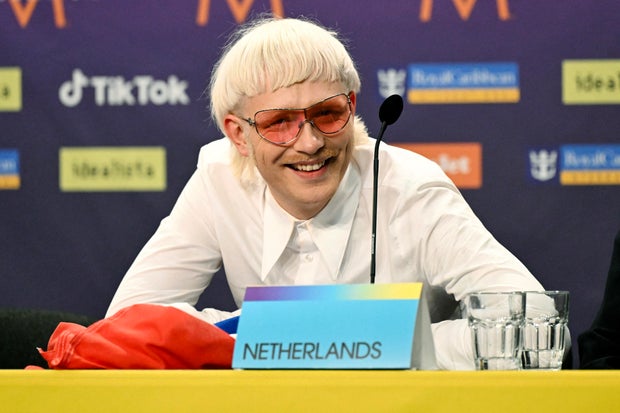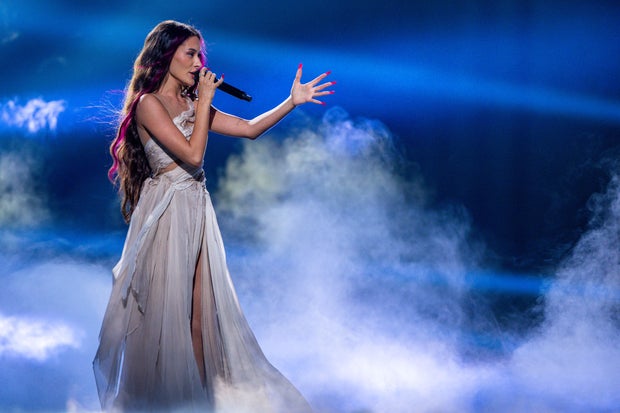The Netherlands’ competitor in Eurovision Song Contest was expelled from the competition hours before Saturday’s final of the pancontinental pop competition, which was rocked by protests against Israel’s participation.
Competition organizer the European Broadcasting Union said Swedish police were investigating “a complaint made by a woman from the production team” against Dutch artist Joost Klein. The organizer said it would not be appropriate for Klein to participate in the event while the legal process is ongoing.
Although Eurovision’s motto is “united by music”, this year’s event has proven to be controversial. Israel’s participation drew large pro-Palestinian demonstrations, with protesters saying the country should be excluded due to its conduct in the war in the Gaza Strip.
Klein, a 26-year-old Dutch singer and rapper, was a favorite with bookmakers and fans alike with his song “Europapa.”
He failed to attend two dress rehearsals on Friday, and the EBU said it was investigating an “incident”. Dutch broadcaster AVROTROS, one of dozens of public broadcasters collectively funding and broadcasting the contest, said that when Klein walked off stage after Thursday’s semi-final, he was filmed without his consent and in turn made a “move threatening” towards the camera.
The broadcaster said Klein did not touch the camera or the camera operator and called his expulsion a “very heavy and disproportionate” punishment.
Jessica Gow via Getty Images
Some music lovers in the Eurovision fan park expressed dismay at the Dutch expulsion. Sven Sherman from Sweden said it was “a shame that a song that is absolutely made for Europe” had now been disqualified.
“I mean, honestly, what country has done so many good things for Europe like the Netherlands? So it’s really a shame and I hope next year they come back again,” he said.
It all makes for a confusing climax to an event that draws adoration and derision with its campy, kitschy spirit and passion for pop.
Tensions and nervousness were palpable in the hours leading up to the final, where 25 artists – whittled down from 37 contestants by two semi-finals – are expected to perform three-minute songs in front of a live audience of thousands and around 180 million people. viewers around the world. .
Several performers were absent from the Olympics-style performers’ entrance at the start of the final dress rehearsal, although all except Ireland’s Bambie Thug performed.
The Irish artist issued a statement saying the absence was due to a situation “which I consider needs urgent attention from the EBU” and telling fans: “I hope to see you on stage later.”
Jens Battner via Getty Images
French singer Slimane interrupted his song “Mon Amour” at the dress rehearsal to give a speech asking people to unite “for music, yes – but with love, for peace”.
The behind-the-scenes drama is overshadowing a competition whose entries range from the emotional to the eccentric. They include the silly 1990s nostalgia of Finland’s Windows95man, who emerges from a giant egg on stage wearing very little clothing. Bambie Thug summons witchy spirits on stage and brought a scream coach to Malmo, while Spanish singer Nebulossa boldly reclaims a term used as an insult to women in “Zorra”.
Favorites include Swiss singer Nemo – who would be the first non-binary Eurovision winner if his operatic song “The Code” topped the voting – and Croatian Baby Lasagna. Their song “Rim Tim Tagi Dim” is a fun rock number that addresses the issue of young Croatians leaving the country in search of a better life.
Dean Vuletic, an expert on the contest’s history, said that despite the contest’s reputation for disposable bubblegum pop, Eurovision often addresses “political and social issues like feminism, European integration, gender identity”.
Sometimes, however, the songs conflict with the contest’s ban on overtly “political” statements. Eurovision organizers told Israel to change the original title of its song, “October Rain” – an apparent reference to the Hamas attack on October 7 that killed around 1,200 people in Israel and triggered the war in Gaza.
Israeli singer Eden Golan has increased the odds since performing the powerful ballad, now titled “Hurricane”, in Thursday’s semi-final. Golan faced some booing at dress rehearsals, but was voted through to the final by viewers around the world.
Jens Battner via Getty Images
Israeli Prime Minister Benjamin Netanyahu praised 20-year-old Golan for his performance despite “battling an ugly wave of anti-Semitism.”
Pro-Palestinian protesters argue that Israel should not be allowed to participate in a war that has killed nearly 35,000 Palestinians, according to the health ministry in Hamas-controlled territory.
Thousands of people marched for the second time this week on Saturday through Sweden’s third-largest city, which has a large Muslim population, to demand a boycott of Israel and a ceasefire in the seven-month war.
Some Palestinian flags were waved in the auditorium during Saturday’s Eurovision dress rehearsal, defying a ban on flags other than those of competing nations.
Competing musicians are feeling the pressure, inundated with messages and abuse on social media and unable to speak out because of competition rules. Italian contestant Angelina Mango made a statement when she entered the Eurovision media center on Friday and sang John Lennon’s “Imagine” as dozens of journalists gathered around her.
Swedish singer Loreen, last year’s Eurovision champion – and one of only two artists to win the contest twice – said world events were “traumatizing” but appealed to people not to shut down the “community of love” that is Eurovision.
“What heals trauma… Does trauma heal trauma? Does negativity heal negativity? It doesn’t work like that,” she told the Associated Press. “The only thing that truly heals trauma – that’s science – is love.”


























